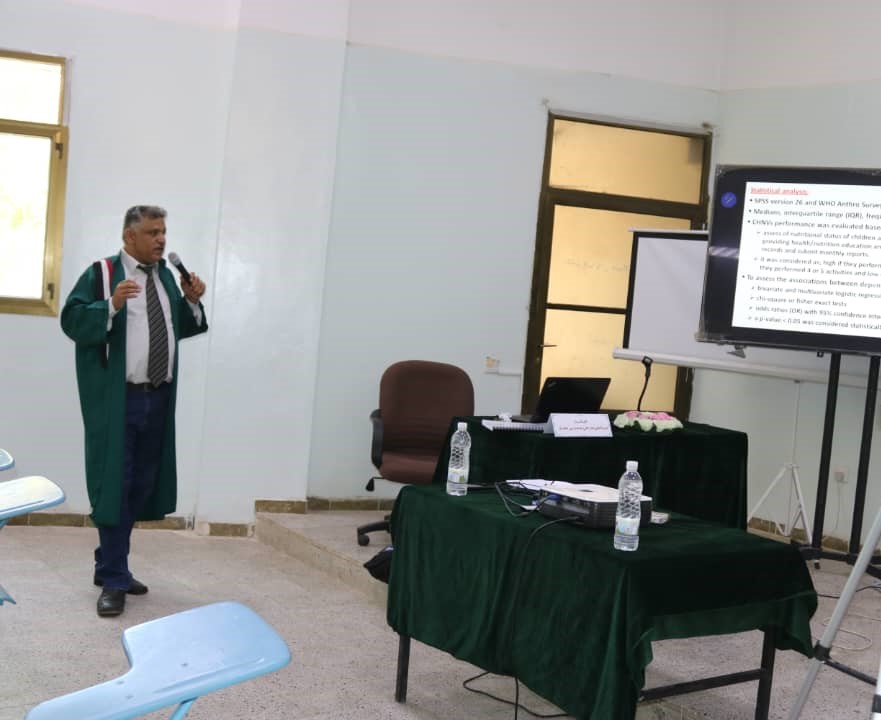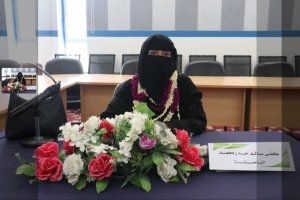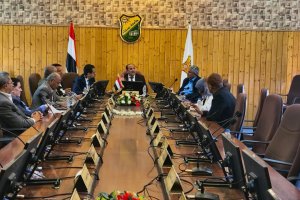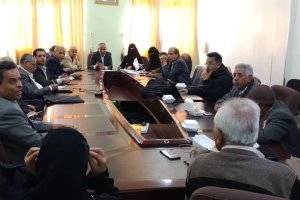the candidate researcher/Abdulkareem Ali Hussein NASSER obtained the Philosophy of Doctorate degree in the major of Medical Microbiology
- Categories Letters and Promotions - Graduate Studies, news, Regulations - Postgraduate Studies
- Date November 8, 2024

Saturday, Rabii-Thani 2nd 1446H, October 5th, 2024, the candidate researcher/
Abdulkareem Ali Hussein NASSER
obtained the Philosophy of Doctorate degree in the major of Medical Microbiology from the Department of Community Medicine, Faculty of Medicine and Health Sciences, Sanaa University,
for his thesis entitled:
Evaluation of the Performance and Potential Effectiveness of Community Health and Nutrition Volunteers, Hajjah, Yemen
The examining committee consisted of:
- Professor Dr. Ahmed Mohammed AL-HADDAD, Principle Supervisor Committee Member,
- Professor Dr. Yahya Ahmed RAJAA, Internal Examiner Head of Committee, and
- Dr. Fares Ali MAHDI, External Examiner Committee Member.
The thesis aims at evaluating the community health and nutrition volunteers (CHNVs) performance and their role in improving the health and nutritional status amongst infants and young children (IYC), and the infant and young child feeding (IYCF) practice and knowledge among mothers in Hajjah governorate.
The study comes out with some results, of which: Performance of CHNVs is adequate in all, 50% of volunteers achieved a high performance range in comparison to weak performance for the other volunteers. The main job and number of 24-month children served by CHNVs are significantly affected the performance of volunteers. Moreover, the CHNVs play a significant role in improving the vaccination status and the coverage rate for vaccines.
The researcher presents a number of recommendations, at the end of this thesis, to improve the performance of the CHNVs and their roles as volunteers throughout:
– Ongoing training is essential for CHNVs to develop the skills and knowledge they need for better performance and assuring collaboration between CHNVs and health and community services,
– Periodic meetings and regular supervisory visits being primordial for monitoring and supporting CHNVs.
– Ensuring availability of essential equipment and supplies in need for the CHNVs so as to provide their services and activities properly.
– Executing future research using an experimental or intervention design for a long time to explore the impact of the CHNVs program and the casual relationship between the village type and variables.
Attendees of the session were a number of academics, researchers, students of the major, the researcher’s colleagues and some of family members.
Previous post
Public PhD Viva-Voice Examination of Mr. Abdulrahman Qaid Abdullah Alyosefi
Next post
Public MSc Viva-Voce Examination of Ms. Safya Mustafa Alawi Bin Al-Sheikh Abu Bakr
You may also like






